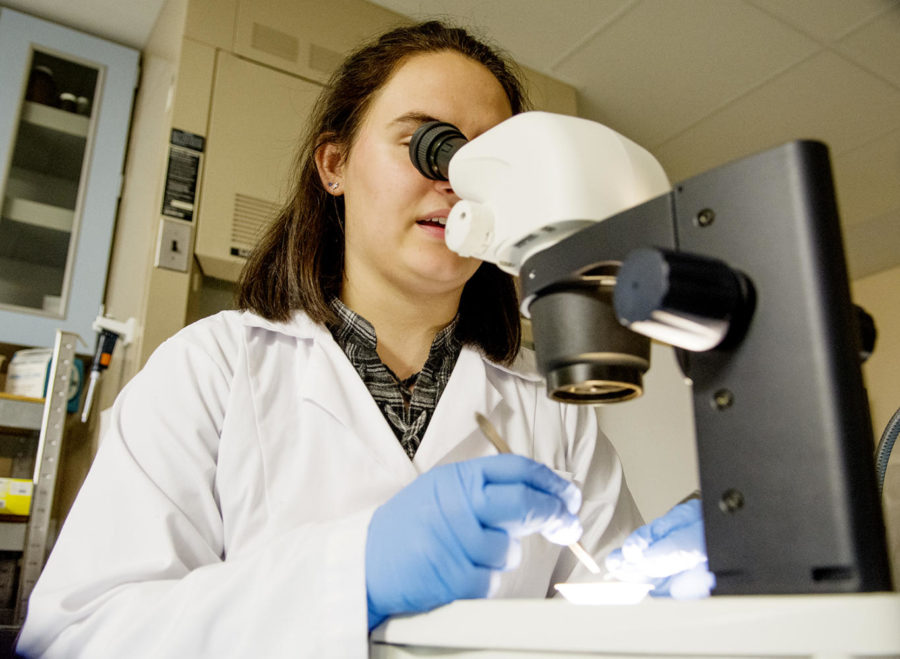Campus scientists studying ways to combat extremely early puberty
Elizabeth Geerling, a senior from St. Louis studying biological sciences, studies the the reproductive system of a male mouse Tuesday, Oct. 3, 2017, in Life Sciences III. “I think our model has really evolved into a mechanism that can be used to explore other reproductive issues,” Geerling said. (Cory Ray| @coryray_de)
October 19, 2017
The ever-dreaded puberty usually strikes preteens, but some researchers at SIU are studying a dysfunction that leads to extremely early puberty in boys to understand how to combat it.
Physiology professor Prema Narayan is primarily concerned with studying a mutation that causes the early onset puberty. In human males, it’s known as familial male-limited precocious puberty (FMPP).
Narayan said studying the mutation is important for understanding many types of sexual dysfunctions.
Advertisement
Boys usually undergo puberty during their preteen years, but those with FMPP can hit puberty by the time they’re two years old, said Elizabeth Geerling, a senior from St. Louis studying biological sciences.
According to U.S National Library of Medicine, those boys can act out and even start to grow facial hair. While she said treatments exist to decrease hormone levels in these patients, there aren’t many studies about what happens to them later in life.
Primarily, she wants to know if it affects reproduction and fertility.
“Since there’s not a lot of follow-up done with these FMPP patients, I think our research is important because we can shed light if maybe these males are infertile later in life,” she said.
Geerling said girls with the mutation have no consequences, but female mice do. She said the finding is interesting since mice are so related to humans in biological terms.
While it may be different in females, she said male mice exhibit similar effects when they are induced to undergo early puberty.
The defect is a mutation in a hormone receptor that causes an increase in testosterone levels in males.
Advertisement*
Geerling said if they can understand what the mutation does, they can potentially combat a variety of reproductive issues — including erectile dysfunction.
She and others in the lab induce puberty in mice when they are two weeks old; she said mice usually become sexually mature at five weeks old.
From there, Geerling performs a variety of experiments, including surgeries, dissections and DNA and antibody studies.
She found those mice become infertile by six months old, and she said the research could be expanded in the future to see if the same is true for humans.
Right now, she and the others in the lab are working to prove the infertility is a result of high testosterone levels.
Geerling has worked in Narayan’s lab for three years — since her first semester at SIU — and she’s seen many changes to research funding throughout her time in the lab.
When she started, she was an undergraduate research assistant under the Center for Undergraduate Research and Creative Activities; her time in the lab was her job.
When she won a REACH Grant at the end of her sophomore year, however, she was told she wouldn’t be funded as a UGA. Eventually, she was funded again.
For her final semester this year, she is unfunded due to the closure of CURCA. She now is in the lab earning class credit.
She said even if she couldn’t receive any sort of incentive from the university, she would still do the work.
“It was really upsetting, but I knew that I still really enjoyed working in the lab,” she said. “I’m not in it for the money … it worked out, but it’s hard not getting paid anything.”
While Geerling said she has managed to not decrease any of her time in the lab, other researchers have said they’ve had to get extra jobs and reduce their research experience.
“I chose to come to SIU pretty much solely because of the undergraduate research opportunities,” Geerling said.
She said that growth didn’t come without overcoming fear. When she first entered the lab, she said she was afraid she’d be too squeamish to do the work.
Narayan said she’s seen Geerling grow from her first semester, when she was very anxious about the dissections, to now, when she is largely able to operate independently in the lab.
“If I wouldn’t have come here, I would have ever known that’s what I want to do with my life,” Geerling said.
Geerling said her research has inspired her to apply for doctoral programs related to studying the immune system for next fall, instead of her original goal of becoming a medical doctor.
“In high school, you learn about medical fields, but not really about doing research,” she said. “At the end of my freshman year, I was certain I wanted to do research for my career. I have felt just as strongly about that ever since.”
Staff writer Cory Ray can be reached at [email protected] or on Twitter @coryray_de.
To stay up to date with all your Carbondale news, follow the Daily Egyptian on Facebook and Twitter.
Advertisement









